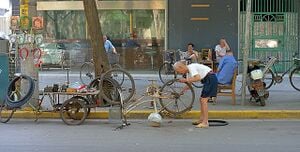
4 Reasons Why The Future Of Capitalism Is Homegrown, Small Scale, And Independent, Dec 5[1]
Nov 2011[edit | edit source]
What does a post-growth economy look like? By Jeremy Williams: Will ending growth create massive unemployment? Nov 18
- Under our current system, there are disastrous job losses whenever the economy goes into recession. It’s an inherently unstable system that is guaranteed to deliver a jobs cull every ten to twelve years, until it eventually runs out of steam altogether. The transition may be rocky, but a steady state should be much more stable in the longer term.
- In the new economy, growth in materials will be limited, but there will still be plenty of change within the system. New businesses will start and jobs will be created. Some sectors will shrink – aviation, oil extraction and so on, but other sectors will boom. Renewable energy is going to be a growing industry for some time to come. Without cheap oil, some aspects of globalization may go into reverse, bringing manufacturing jobs nearer to the point of sale. Food sources will relocalize, re-invigorating local agriculture.
- On my walk to the station I pass a tailor, a lawnmower workshop and a TV repair man, all of which are unusual, but these kinds of businesses will be returning to a street near you. As we move away from a throwaway culture, repairing, renovating and recycling will be more important. As resources become more expensive, the price of material goods will rise. Those with disposable income may choose to spend it on services rather than products – a spa visit rather than a shopping spree. This is often referred to as the ‘Cinderella economy’, and it has a healthy future.[2]
Oct 2011[edit | edit source]
ILO says world heading for a new and deeper jobs recession, warns of more social unrest. ILO warns of a generation “scarred” by a worsening global youth employment crisis. Oct 31[3]
The International Labour Organization (ILO) has warned of a “scarred” generation of young workers facing a dangerous mix of high unemployment, increased inactivity and precarious work in developed countries, as well as persistently high working poverty in the developing world. Oct 19[4]
"Throughout the world women are key actors in maintaining the sustaining livelihoods and welfare of their families and communities, and in making a transition to a more equitable and sustainable world. Our economy is linked to and depends on a healthy planet. It also depends on women’s economic contributions, both formal and informal.
- Women’s Vision for Rio+20: an Equitable and Sustainable World
- Social equity, gender equality and environmental justice must form the heart of sustainable development and of the outcomes of the Rio+20 UN conference in 2012. Twenty years after the first Rio conference, great social and economic inequities still remain. These inequities especially affect women and children, who make up the majority of those living in poverty.
- Measures to ensure equity, equality, social and environmental justice need to be prioritized, as these are the cornerstones for achieving sustainable development globally."[5]
Jul-Sep 2011[edit | edit source]
Growth, mad men and economists: Why we need an intergenerational and interconnected economy, Sep 30[6]
"Worshipping unfalteringly at the altar of paid work exhibits a tunnel view of how value is created in society", Aug 24[7]
Jan-Jun 2011[edit | edit source]
"...central to any new economic system must be the due place and recognition of care work which people do which is informal, binding and unpaid. This is not volunteering, which implies a certain amount of free will, choosing your time and project and number of hours to put to it. Informal, binding, unpaid care is the sort which goes on in every household and family everywhere, which oils the wheels and is often done largely unnoticed (unless something like illness suddenly prevents it from being done.) The 'binding' bit is the key to differentiating it from voluntary work - most informal carers would never walk away from their babies, children, elderly relatives or other dependants, so they just carry on regardless until the situation changes.The majority (although of course not all) doing informal, binding, unpaid care work are women, especially thinking globally. Any new, sustainable, more humane economic system must take them and their IBU care work into account." Mar 22[8]
2007[edit | edit source]
"Environmentalism can't succeed until it confronts the destructive nature of modern work - and supplants it."[9]
See also[edit | edit source]
local information can be found, or shared, via our many location pages
References[edit | edit source]
- ↑ fastcodesign.com
- ↑ P2P Foundation
- ↑ World of Work Report 2011- Press release
- ↑ ILO, Press release
- ↑ Quote from introduction from Women’s Major Group Summary, Input to ... (Rio+20) (link not found)
- ↑ SustainAbility
- ↑ We have lost the plot by 'worshipping paid work', Gareth Morgan and Susan Guthrie, interest.co.nz
- ↑ care work which people do which is informal, binding and unpaid, by Cathy Aitchison on March 22, 2011: (link not found)
- ↑ The Ecology of Work by Curtis White, Published in the May/June 2007 issue of Orion magazine